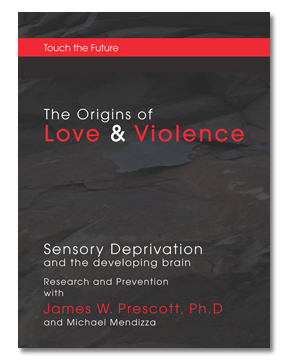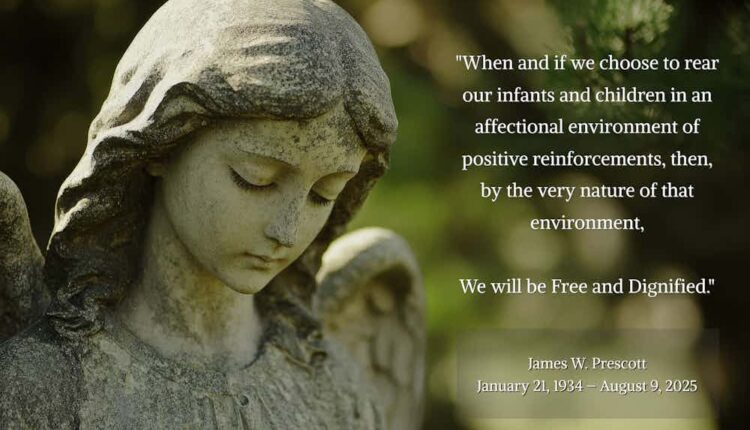Remembering James W. Prescott, Early Childhood Development Pioneer and Scientist
The percent likelihood of a society becoming physically violent if it is physically affectionate towards its infants and tolerant of premarital sexual behavior is 2 percent. The probability of this relationship occurring by chance is 125,000 to one. I am not aware of any other developmental variable that has such a high degree of predictive validity.
James W. Prescott (1934–2025)
Renowned Scientist and Advocate for Early Childhood Development
 James W. Prescott, a pioneering researcher whose work on the effects of early childhood experiences on human development forever altered our understanding of health and well-being, passed away on August 8, 2025, at the age of 91.
James W. Prescott, a pioneering researcher whose work on the effects of early childhood experiences on human development forever altered our understanding of health and well-being, passed away on August 8, 2025, at the age of 91.
Dr. Prescott’s groundbreaking research focused on the profound impact of early sensory and emotional experiences, particularly in infancy, on brain development and lifelong physical and mental health. His work in the field of developmental psychology emphasized the essential role of affectionate touch, attachment, and nurturing care in fostering healthy development in the early years of life. His research challenged conventional views and contributed significantly to the movement advocating for the importance of non-invasive, loving caregiving practices.

Dr. Prescott’s work gained widespread recognition after being featured in the 1987 TIME LIFE documentary Rock-a-Bye Baby. The film highlighted his pioneering research on the neurological and emotional consequences of sensory deprivation in infancy, a subject that had far-reaching implications for parenting, healthcare, and public policy. His findings sparked a shift in conversations about childhood care and the lifelong effects of early relational health.
Prescott was a health scientist administrator at the National Institute of Child Health and Human Development (NICHD), one of the Institutes of the US National Institutes of Health (NIH) from 1966 to 1980. He created and directed the Developmental Behavioral Biology Program at the NICHD where he initiated NICHD-supported research programs to study the relationship between mother-child bonding and the development of social abilities in adult life. Prescott also served as assistant head of the Psychology Branch of the Office of Naval Research (1963 to 1966) and as president of the Maryland Psychological Association (1970 to 1971). In 1973 he was one of the signers of the Humanist Manifesto.
Beyond his research, Dr. Prescott was a passionate advocate for policies that prioritized early childhood care, particularly in maternal health and mental well-being. His advocacy extended through his work as a public educator, and he was a driving force behind efforts to reshape societal norms regarding caregiving practices.
Dr. Prescott’s legacy is not just in his research but in the lives he touched through mentorship and his dedication to improving the lives of children worldwide. He inspired countless scientists and researchers who continue to carry forward his mission of fostering healthy, emotionally nurturing environments for children.
Dr. Prescott is survived by his loving family, colleagues, and many students who will carry his passion and knowledge into the future of research and advocacy. His contributions to science and his efforts to make the world a kinder and more nurturing place for children will never be forgotten.
A memorial service will be held at a later date. Donations in his memory may be made to organizations that support early childhood development and advocacy.
Dr. Prescott’s groundbreaking work, dedication to his field, and his deep empathy for children will continue to inspire and guide the future of developmental psychology for years to come.
Modern technologies of warfare have made it possible for an individual or nation to bring total destruction to large segments of our population. And the greatest threat comes from those nations which have the most depriving environments for their children and which are the most repressive of sexual affection and female sexuality. We will have the most to fear when these nations acquire the weapons of modern warfare. Tragically, this has already begun. – James W. Prescott
Learn More About Dr. Prescott’s Work
Watch Dr. Darcia Narvaez’s Tribute to Dr. Prescott below and here.
Watch Dr. Prescott’s presentation on Human Nature and Early Experience at the University of Notre Dame Symposium in 2010.
Watch the TIME LIFE Documentary, Rock-a-Bye Baby, featuring Dr. Prescott’s work, here.
Find a compendium of Dr. Prescott’s research and curriculum vitae here.
Read James Prescott on Kindred
Rock-a-bye Baby Documentary: The Harlow Monkey Experiment
Absence Of Pleasure More Traumatizing Than Physical Pain
Breastfeeding and Bonding Prevent Infant Mortality and Adult Suicide
Sensory Deprivation and the Developing Brain
How Culture Shapes The Developing Brain And The Future Of Humanity


